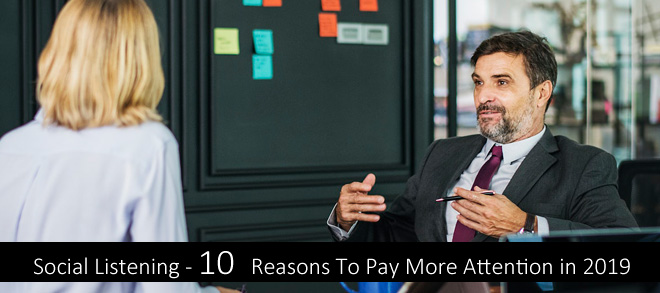
Nowadays (social media) walls not only have ears, but mouths too that speak so loudly, they can be heard across the globe with just one click and the right hashtags.
With over 3.2 billion monthly active users (and counting), social media is the loudest place on earth driving all kinds of conversations, much of which involve or revolve around brands and businesses.
In fact, most people use social media to learn more about brands prior to purchase. Part of what they look out for is comments, mentions or reviews; what other users or consumers have said about you or your products/services.
If you aren’t actively listening you’ll be unable to actively participate in such critical conversations that may permanently (re)shape your brand perception for good or bad.
And trust me, you don’t want to be judged and sentenced in absentia when your case is called in the social courts. The verdict can be damning, damaging, with far reaching consequences for your brand and business.
In this post, I’ll talk a bit about social listening and highlight how and why brands should pay (more) attention in 2019, but first
What is Social Listening?
Like active listening, social listening involves more than just social monitoring or tracking social mentions. It also involves analyzing and appropriately responding to mentions, plus getting feedback that your response was adequate and effective in addressing customer concerns.
Everyday brands get battered or bettered via social mentions. Without active social listening, you could miss out on valuable insight that could help or hurt your business.
And since timing is also key, it is important to quickly discover, dissect and deal with social sentiments that accompany any such mentions. This is essential to prevent or mitigate the spread of false rumor, negative press or social hearsay.
Which brings us to
The Key Elements of Effective Social Listening

Like in the image above, companies, brands, businesses literally need better:
- (social) listening (devices)
- processors (analysts) and
- microphones (responders).
These make up the three key elements of effective social listening.
The following shows
Google Trends of Social Listening in the Last Half Decade (Worldwide)
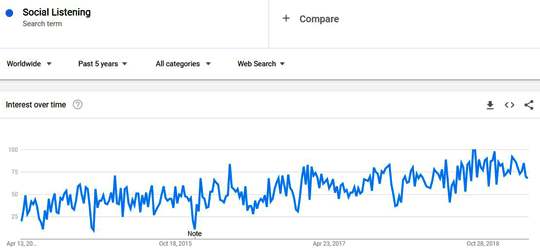
Over the last 5 years brands seem to be paying more attention to social listening, with interest nearly tripling in size. You too should.
But Why Listen You Ask?
Because people (including consumers, customers, followers, etc) are constantly talking. And if there’s someone talking there should be someone, not only hearing but listening and paying rapt attention.
To further drive the point home, here are
Two Brands that Didn’t Listen – and Learnt Their Lesson
Waterloo based RIM, makers of the then very popular BlackBerry, met its waterloo because it didn’t listen. Worth over $42b in 2007 and millions of users, the company and many analysts couldn’t imagine a smartphone market without BlackBerry.
In fact Jim Balsillie,then co-CEO said “he wasn’t bothered nor losing sleep” over the Apple iPhone which launched a few days prior. How wrong he was.
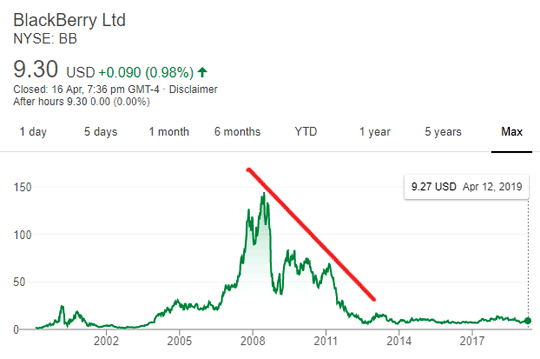
Eventually, BlackBerry lost its place and people, and came crashing down a steep slope with a big thud. By 2011, RIM had lost over 75% of its stock value.
Sadly Nokia towed a similar path and also lost it’s huge market share to newer competitors in Apple iPhone and Google Android OS.

Thankfully, both BlackBerry and Nokia have learned their lesson (albeit the hard way) and are now playing catch up trying to do what customers and trends said years ago.
If you don’t want to repeat the Nokia and BlackBerry mistakes, then here are
10 Reasons to Pay More Attention in 2019
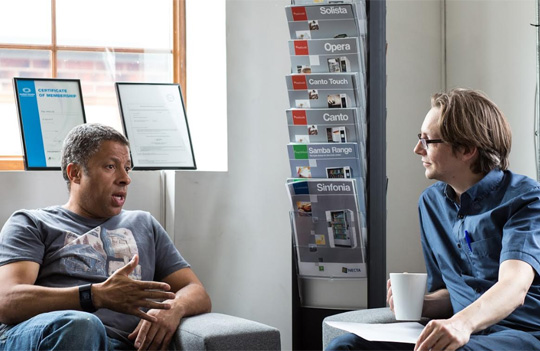
1. They’re Talking
Whether or not you’re listening, people are typing and talking, always. And especially on social media where there are now billions of active users.
Imagine a tenth of this population pushing a hashtag like #DEARBLACKBERRY which went viral and resulted in a lot of negative press for RIM.

Users vented their anger and frustrations at the company especially over its PlayBook, apps market restrictions, non-use of WhatsApp, etc.
2. Their Friends (and their friends friends friends…) are Listening
Social connections can be complicated sometimes, just like on Facebook where you probably share mutual friends with mutual friends of your mutual friend’s mutual friends.
One complaint about your brand (even when you’re not listening) and all these connections can start a hashtag campaign against you and you’ve no idea where or when it will end.
Social sentiment is huge and you can manage to sway it your way on time if you’re paying keen attention to your social media mentions.
3. Your Competitors are Also Listening
All the while RIM refused to listen, Apple and Google were paying keen attention to BlackBerry users complains and plotting to chop their piece of the pie.
They literally took it all from BB which slid into losses and sacked workers due to inability to pay. The iOS and especially Android developers listened to BB users complains, opened up the smartphone market and BB users wasted no time jumping ship.
No matter how big you are you can never be bigger than your customers or user base. Always listen to what they say, especially what they repeatedly say. Customer or user feedback is golden.
4. Digital Passersby Are Also Listening
A digital passerby can include one who discovers your profile or timeline by searching social media or by accident. Perhaps they were looking for a review of your products/services and came upon your brand name.
Even if they’re in purchase mode, hearing (a lot of) negative press about your brand can make them change their mind. And since social hearsay is also a thing, you’ve no idea who they’re bad mouthing you to based on what they read about you.
Effective social listening can help mitigate this and put you in the right position to nip it in the bud before it grows out of hand.
5. Free Publicity
Brand mentions give you free publicity especially when it trends. People who never heard of your brand suddenly take notice. Your website traffic may also increase as more people try to check you out.
Unfortunately, even free publicity can be costly if it is negative. This is another reason you should have your ears on the ground. This way you can tell if you’re about to become popular for the wrong reasons.
And since there is no second chance for a first impression, you want to make yours your best impression. On the other hand, if it is good publicity, then great.
6. It is a Form of Marketing
Good or bad publicity, smart entrepreneurs or marketers know how to turn it to their advantage. Of course, for good publicity, it is easier. Problem is people tend to remember and share their bad experiences more.
For bad publicity, it is more difficult and requires certain damage control skills to manage the situation and turn it around. Both cases present a marketing opportunity.
Well handled, a complaint can result in praise from the complainant and their symphatisers; a great PR stunt if you ask me. Poorly handled, disaster.
[See related post: How To Deal With Trolls Before They Ruin Your Brand]
7. Gain New Customers
When complainants, their sympathizers or other digital passers-by clearly see that you have taken time to listen, analyze and adequately respond to complaints, they’re pacified.
This can be achieved via several means. Responding to them on first name basis, acknowledging their feelings, reassuring them, following up and delivering on promises, replacement, refund or gifts, etc.
These will portray you as a brand that is not only present but also attentive and responsive. This can gain you new customers and followers who can become brand evangelists.
8 Gain Insight About Your Competitors
With a solid social listening strategy in place you can also track competitor mentions. The information you gather from this can give valuable insight into competitor strategies.
You can also learn about the weaknesses and strengths of competitors and where their customers demand better. Apple and Google cashed in on BlackBerry’s strongest weaknesses.
Social listening can help you learn a lot about your competitors on social media, and how you can match or beat them.
9. Gain Keyword Performance Insight
With social listening you can also keep track of and monitor keyword appearance and performance across platforms. You would be notified when your targeted keywords are mentioned.
You can also do the same for your branded hashtags. You can monitor how many times and places your hashtags are being used.
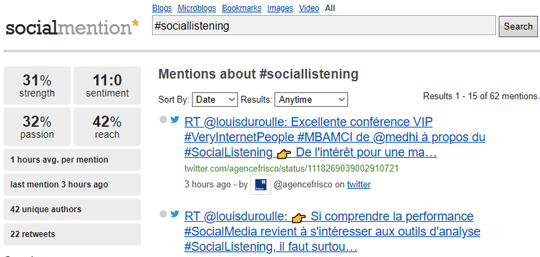
This insight can inform your future keyword or hashtag strategy. This is very important, as you’re not listening only to learn what has happened but also to strategize for the future. This futuristic approach to social listening will move you from reactive to proactive.
10. Get Insight for Content, Ad Campaigns, etc.
When you listen, you not only hear what they say. You should also watch out for how they say it, when and where. These can help you better communicate with your audience when you respond to or engage them.
You can also include bits and pieces of what you learned from actively listening, into your social media posts, ads, blog posts, etc. It goes to show you’re in tune with the trends and can speak their language, including some of their slang or new lingo.
You can also get raw materials for future case studies about how listening helped identify customer needs, how you developed a product or service to fix it and how the customers are happier for it.
Following are
22 Popular Social Listening Tools to Try
- AgoraPulse
- Awario
- Audiense
- BrandWatch
- BuzzSumo
- HootSuite
- HootSuite Insights
- HowSociable
- HubSpot
- KeyHole
- Mention
- Mentionlytics
- NetBase
- Reddit Keyword Monitor Pro
- Review Trackers
- SocialMention
- Sprout Social
- SumAll
- Synthesio
- TalkWalker
- TweetPeak
- TweetReach
Conclusion
Social listening will become even more important as Internet access and social media usage continue to grow.
Now, more than ever, brands and businesses must as a matter of urgency begin to plan and develop a social listening strategy that can help them gather, process and adequately respond to customer feedback.
[Images – Main Image by rawpixel.com; Conversation: Pixabay]
Amos Onwukwe is an AWAI trained Business and Ecommerce Copywriter who has been featured in scores of blogs including Huffington Post, Dumb Little Man, Ecommerce Nation, eCommerce Insights, Understanding Ecommerce, Result First, Floship, Successful Startup 101, Small Biz Club, Small Business Bonfire, among others.
Twitter: @amos_onwukwe